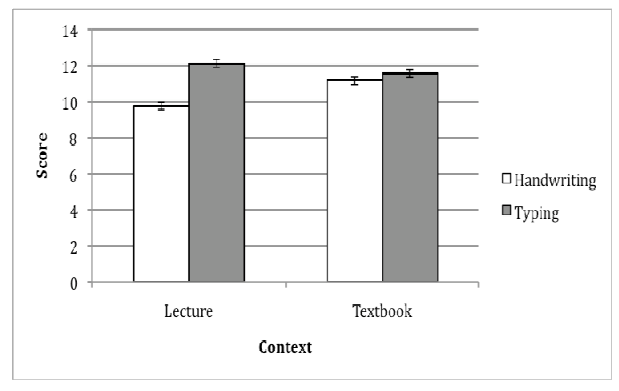A recent senior thesis by Schoen (2012) addressed this exact question. Students watched a filmed lecture and were randomly assigned to take notes with either by typing or handwriting. After the lecture, students were given a few distractor tasks, and then given a retention test. Other students were assigned to take notes from a textbook, instead of a lecture.
In contrast to your theory, there was a main effect of transcription method, such that typing notes led to better retention. However, there was an interaction with context, and it appears that there is no simple main effect for textbook notes. (see figure below)
One could posit that this interaction occurs because of the demands of the task. Taking notes by typing is easier and faster, i.e. more fluent. Hand-writing notes leads to higher cognitive load, which may lead to the student paying more attention to note-taking and less attention to the lecture itself. This would explain why textbook notes showed no effect. I only skimmed through the paper, but it seems very interesting and right to the point of your question, so I would suggest reading it for more info.
Additional information:
Before looking this up, I expected the opposite pattern. Bjork & Bjork (2009) have found
that creating desirable difficulties in learning can promote retention. For instance, it is well known that generating information, such as fill-in-the-blanks, promote better retention compared to, e.g., multiple choice tests. Diemand-Yauman, Oppenheimer, & Vaughan (2010) have found that presenting study material in hard-to-read fonts leads to better encoding and retention of the material.
Similarly, a study by Yang, Gallo, & Beilock (2009) looked at the effect of motor fluency on retention. Subjects typed a two-letter dyad (such as ae or aq). Fluent dyads were letter pairs which were typed with two fingers; these pairs are typed faster and more easily than dyads that used the same finger because there is no motor bottleneck. Subjects were later given a recognition test to determine which dyads were presented to them. They found that subjects produced more false alarms for fluent dyads than disfluent dyads. This is particularly strange because false alarms, by their nature, were not actually typed by subject. This effect only held for expert typists, corroborating previous literature which suggests that fluency leads to false recognition. (Presumably for novice typists, none of the dyads were fluent enough to produce a higher level of false alarms).
So it seems there is a confluence of effects here. Disfluency--that is, making things more difficult--can promote deep processing and lead to better encoding and retention. However when this process causes one to neglect other information, such as paying attention to the lecture itself, retention suffers.
For additional reading on the effects of fluency on problem solving, I suggest Alter, Oppenheimer, Epley, & Eyre (2007) and Oppenheimer (2008).
From Schoen (2012):

Alter, A. L., Oppenheimer, D. M., Epley, N., & Eyre, R. N. (2007). Overcoming intuition: metacognitive difficulty activates analytic reasoning. Journal of Experimental Psychology: General, 136(4), 569. PDF
Bjork, E. L., & Bjork, R. (2009). Making things hard on yourself, but in a good way: Creating desirable difficulties to enhance learning. New York: Worth Publishers. PDF
Diemand-Yauman, C., Oppenheimer, D. M., & Vaughan, E. B. (2011). Fortune favors the Bold (and the Italicized): Effects of disfluency on educational outcomes. Cognition, 118(1), 111-115. PDF
Oppenheimer, D. M. (2008). The secret life of fluency. Trends in Cognitive Sciences, 12(6), 237-241. PDF
Schoen, I. (2012). Effects of Method and Context of Note-taking on Memory: Handwriting versus Typing in Lecture and Textbook-Reading Contexts. Pitzer Senior Theses. Paper 20. PDF
Yang, S. J., Gallo, D. A., & Beilock, S. L. (2009). Embodied memory judgments: a case of motor fluency. Journal of Experimental Psychology: Learning, Memory, and Cognition; Journal of Experimental Psychology: Learning, Memory, and Cognition, 35(5), 1359. PDF
